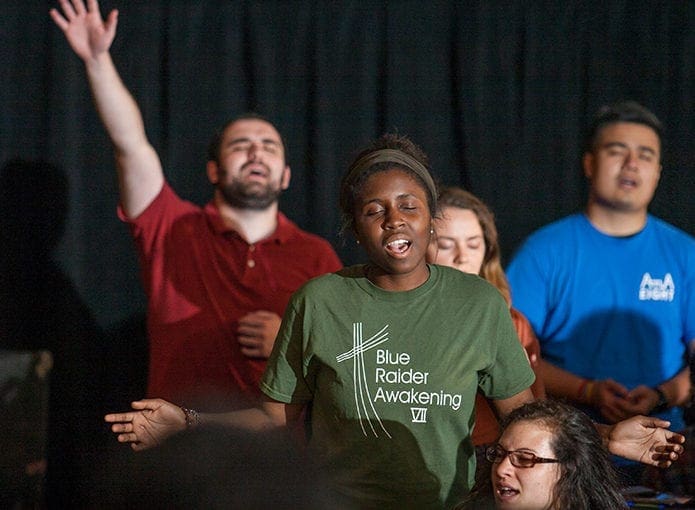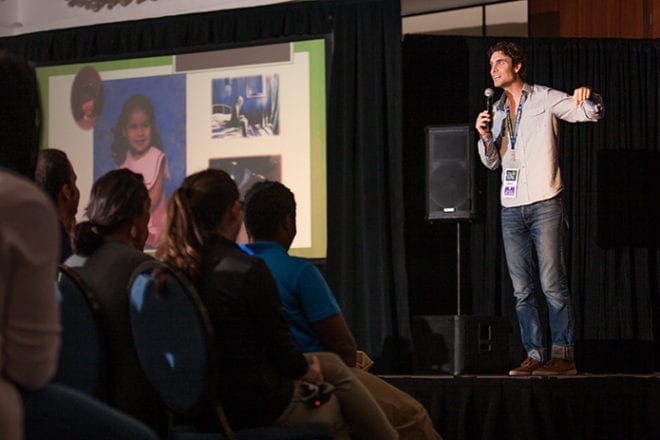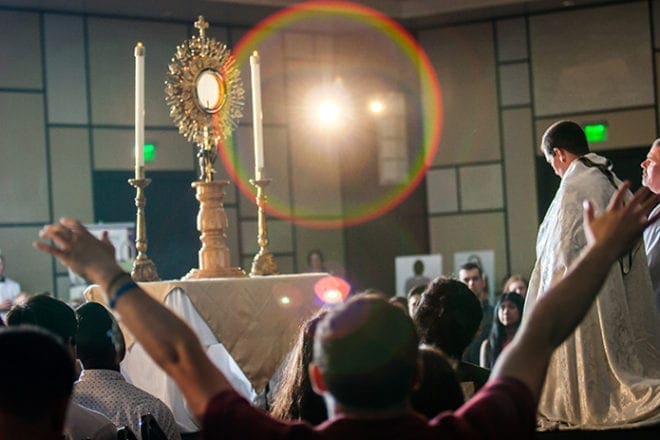 Photo by Thomas Spink
Photo by Thomas SpinkCollege Park
Openness to why young Catholics pull away from the church is key, speaker says
By ERIKA ANDERSON REDDING, Special to the Bulletin | Published June 23, 2017
COLLEGE PARK—If the 2017 Eucharistic Congress is any indication, the future of the Catholic Church is in capable, faithful hands.
From the Friday night “Revive” track on June 16 to the Saturday English and Spanish tracks, young adults flocked to the Eucharistic Congress at the Georgia International Convention Center June 16 and 17.

Evan Lemoine, keynote speaker for the Friday evening young adult track at the 2017 Eucharistic Congress, shared his story about growing up in Louisiana and the choices and behaviors that affected his family. Photo By Thomas Spink
At “Revive,” keynote speaker Evan Lemoine spoke about growing up in Louisiana and the choices and behaviors that affected his family. Young adults in attendance raised their hands in praise and worship as Greg Ferrara and Geneva Tigue led music. Emcee Dom Quaglia spoke about his experience in attending World Youth Day and meeting Pope Francis as a newlywed.
Young adults were also the focus of speaker Brandon Vogt’s talk on Saturday, June 17, as he shared his strategies for bringing young people back to the Catholic Church.
Nearly 80 percent of people who leave the church leave by age 23—and 50 percent of young adults raised Catholic are among those who leave.
This cannot be a “passive, wait-and-see game,” Vogt said. “We need an active strategy.”
Vogt, himself a young adult, is the content director for Bishop Robert Barron’s Word on Fire Catholic ministries. He also was recognized as one of the Top 30 Catholics under 30 by FOCUS, a Catholic collegiate outreach ministry.
Vogt spoke about “bad strategies” that keep young adults from coming back to the church, including nagging.
“Nagging breeds resentment,” he said. “No one has ever come back to the church because they resent it.”
Many young Catholics leave because they disagree with some of the core church teachings, especially those on sexuality and contraception. One of the biggest mistakes people can make is to dismiss these issues.
“The worst thing is for you to treat them with derision. We need to take their objections seriously,” he said.
Show “friendly curiosity”
Vogt then focused on the seven steps to draw young people back. First and most important, he said, is prayer and fasting.
“If you’re not praying for a young person to come back to the church, you’re wasting your time,” he said. “There is an adoration chapel right down the hall. Take a moment to stop by and pray for a young person in your life to come back to the church.”
Other strategies included planting “seed gifts,” like CDs, books and DVDs that help young people think about religion again.
To discuss the church, the best way to start a conversation, Vogt said, is to use an approach of “friendly curiosity.”
“You need to have a spirit of genuine curiosity. The goal is not to get them back in that one conversation. Start by asking ‘what’s the biggest thing keeping you from returning to the church?’” he said. “If you have the answer to that question, you now have direction.”
Another important step is to invite and connect young adults to the church.
“As soon as a young person expresses any openness to the faith, invite them to something where they’ll interact with other vibrant believers,” Vogt said. “It doesn’t have to be Mass. It can be a Bible study or even a parish festival that will stir up some nostalgic memories.”
Overall, the goal in engaging young adults who have left the church is to take baby steps in bringing them home.
“The key here is to persevere. The goal is to help them move just one step closer to God,” Vogt said. “Over time, those steps will add up.”
Pope’s message attracts many
For many young adults who attended the 2017 Eucharistic Congress, they are hopeful that their generation will stay engaged and involved. Attending the congress is one way for them to worship with the young adult community, said Grace Jacobi, 24, a parishioner at St. Joseph Church, Marietta.
“There’s no other place to be around so many Catholic people doing so many Catholic things and have it be completely normal,” she said.

The young adult track at the Eucharistic Congress included a period of adoration of the Blessed Sacrament as the track came to a close on Friday, June 16. Photo by Thomas Spink
Kevin Sevcik, 27, a parishioner at St. Thomas More Church, Decatur, agreed.
“This is a real experience of the universal Catholic Church,” he said. “The expressions of that can be really powerful.”
Though the weight of responsibility for the future of the church can be heavy, many young adults, like Jacobi, feel ready to take it on.
“It can be hard because we’re in an in-between stage. I’m a teacher, and to my students, I’m ‘Ms. Jacobi,’” she said. “But then in other places, I’m a child. It’s good to come to things like this to just be me.”
Emily Prickettt, who also attends St. Thomas More, said that she believes many young people are attracted by the message of Pope Francis.
“His message of love and mercy really just simplifies things to those two important things,” she said. “It helps to show us how to live among everyone in the world, by showing others that love and mercy. As a young person, I think that’s very meaningful.”
Alex Brown, 29, said he hopes his fellow young adults will appreciate the powerful opportunities found within their church.
“I just hope we open our ears and eyes more,” he said. “It took a while for me to see the beauty and goodness that was right in front of me. I just hope more of us answer that call.”